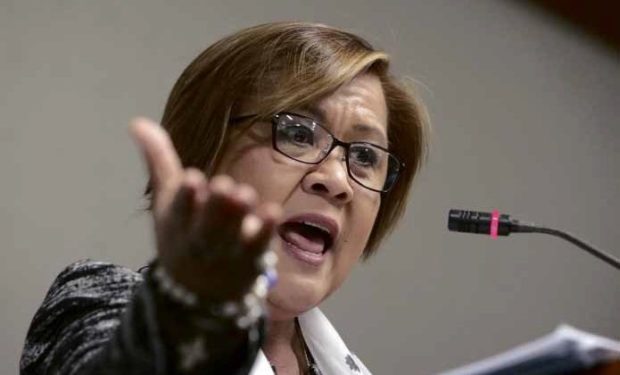MANILA, Philippines — Is she being set up to take the fall?
Sen. Leila de Lima raised this question on Tuesday as she said a letter sent to her by the Office of the Ombudsman asking her to clarify the implementation rules of the good conduct time allowance law was “highly irregular.”
The Ombudsman sent a similar letter to former Sen. Mar Roxas.
De Lima was justice secretary and Roxas interior secretary in the administration of President Benigno Aquino III.
They wrote the implementation rules for Republic Act No. 10592, which took effect in 2014.
De Lima said it was unclear to her how the Ombudsman had categorized her in this matter.
She noted that the letter stated that the Office of the Ombudsman had “opened a fact-finding investigation on alleged irregularities in the implementation” of RA 10592, the law that rewards good behavior in prison.
‘Is this a setup?’
“Am I to be treated here as a resource person, a respondent, or a probable respondent?” she said in a statement from her detention cell.
“Is this a setup for me and [Secretary] Mar into taking the fall for the Sanchez-Faeldon scandal with which we have nothing to do?” she added.
She would consult her lawyer on this matter, she said.
Ombudsman Samuel Martires, in his letters dated Sept. 6 but sent out only on Tuesday, asked De Lima and Roxas to explain in writing why the implementation rules of RA 10592 did not exclude heinous crime convicts from benefiting from the law.
Martires asked why the rules excluded only recidivists and offenders who had been summoned to serve their sentences but had not surrendered.
The Revised Penal Code does not allow heinous crime convicts to benefit from sentence reduction for good behavior.
The Ombudsman gave De Lima and Roxas three days to comply.
De Lima is one of President Rodrigo Duterte’s most vocal critics and is facing drug charges that she says were only made up as retaliation for her investigation of the deaths in the administration’s bloody war on drugs.
Senate inquiry
A Senate inquiry into the good conduct law has been prompted by the controversy over the aborted release of convicted killer and rapist Antonio Sanchez.
An outraged public questioned the plan to release the former mayor of Calauan, Laguna province, for good behavior when he had enjoyed illegal perks in prison and had been involved in illegal drugs.
The President eventually directed officials not to free Sanchez and sacked Bureau of Corrections (BuCor) chief Nicanor Faeldon.
He also said he wanted the Ombudsman to investigate Faeldon and BuCor officials.
Martires on Monday suspended 27 BuCor officials and employees for six months without pay while being investigated for corruption.
On Tuesday, the Ombudsman suspended three more BuCor officials—chief legal officer Anthony Santos, correctional officer Joel Nalva and Supt. Maria Marquez, who, according to Sen. Panfilo Lacson, signed the order for the release of the convicts in the kidnapping, rape and murder of sisters Marijoy and Jacqueline Chiong of Cebu City in 1997 on behalf of Faeldon.
Malacañang welcomed the suspensions on Tuesday. Presidential spokesperson Salvador Panelo said the Palace wanted to know why heinous crime convicts were freed through RA 10592.
“Heads will roll,” Panelo said.
‘Equivocal’ law
President Duterte, in a television interview on Monday night, said he would ask the Supreme Court to clarify the good conduct law, which he described as “equivocal.”
The misapplication of RA 10592 led to the release of more than 2,000 heinous crime convicts, whom Mr. Duterte ordered on Wednesday night to surrender for a review of their records.
The President gave the freed convicts 15 days to turn themselves in or they would be treated as fugitives from the law.
More than 100 convicts had returned to prison since the weekend.
Among them were eight convicts who had been freed from the Davao Prison and Penal Farm in Panabo City, Davao del Norte province, and Iwahig Prison and Penal Farm in Puerto Princesa City, Palawan; seven prisoners who turned themselves in to the authorities in Iloilo, and one who surrendered in Bohol.
The Iloilo Provincial Police Office said on Tuesday that it was monitoring the movements of 17 more prisoners who had been released through the good conduct law.
The Bureau of Immigration, meanwhile, said it was checking its database to find out if there were freed convicts who had left the country. —With reports from Patricia Denise M. Chiu, Gabriel Pabico Lalu, Julie M. Aurelio, Tina G. Santos, Jigger Jerusalem, Nestor P. Burgos Jr. and Leo Udtohan


